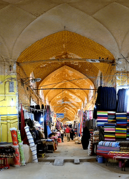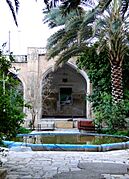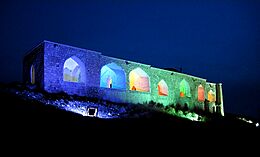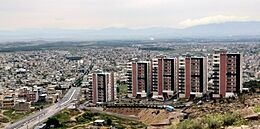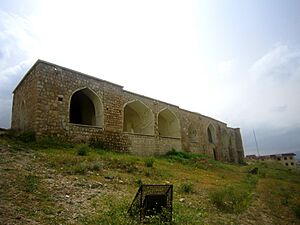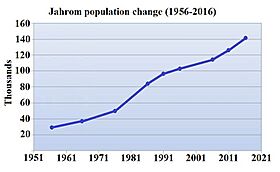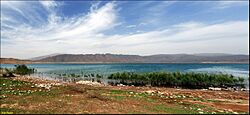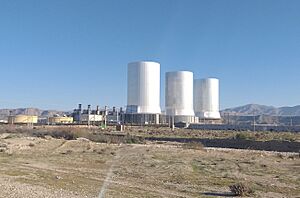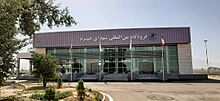Jahrom facts for kids
Quick facts for kids
Jahrom
Persian: جهرم
|
|
|---|---|
|
City
|
|
|
From top to bottom, left to right: Sangtarashan cave, Jahrom bazaar, Khan Mosque, Jahrom fire temple (Qadamgah) and Skyline of Jahrom
|
|
| Nickname(s):
The Green Umbrella, Dar ol-Momenin, City of Sour Gold, Land of Palms and Oranges
|
|
| Country | Iran |
| Province | Fars |
| County | Jahrom |
| District | Central |
| Area | |
| • City | 30 km2 (10 sq mi) |
| Area rank | 2nd |
| Elevation | 1,050 m (3,440 ft) |
| Population
(2016)
|
|
| • City | 141,634 |
| • Density | 4,700/km2 (12,200/sq mi) |
| • Metro | 228,532 |
| • Population rank | 3rd |
| Time zone | UTC+3:30 (IRST) |
| Routes | |
| License plate | 73, 83 |
Jahrom (Persian: جهرم) is a historic city in Fars province, Iran. It's the capital of Jahrom County and the second-largest city in Fars province.
Jahrom is known for its long history. It was founded by Artaxerxes I of Persia, an ancient Achaemenid king. The famous poet Ferdosi even mentioned Jahrom in his epic poem, the Shahnameh. Today, you can visit many old places in Jahrom, like the Sangtarashan cave, the Jameh Mosque of Jahrom, and the old Jahrom bazaar.
The city is about 170 kilometers (105 miles) southeast of Shiraz, the capital of Fars Province. Jahrom has a warm, semi-dry climate. It gets about 285 millimeters (11 inches) of rain each year. The average temperature is around 20°C (68°F). Most people in Jahrom are Persians and Shia Muslims.
Jahrom is an important center for education and medicine in southern Iran. It has several universities and hospitals. The city also has industrial areas, a special economic zone, an international airport, and a petrochemical plant.
The economy of Jahrom mainly relies on farming and industry. Its most important farm products are dates and citrus fruits. Jahrom produces a large amount of the world's dates and citrus every year.
Contents
About the Name Jahrom
There are a few ideas about where the name "Jahrom" comes from.
Meaning of the Name
- Some believe "Jahrom" means "green space." This idea comes from an old text where the city is called "Zarham."
- Another idea, from historian Ahmad Kasravi, suggests "Jahrom" means "warm place."
- A third theory breaks the name into "Ja" (meaning "place") and "Hrom" (an old word for "high and forbidden fortress").
City Nicknames
Jahrom has several cool nicknames:
- Green Umbrella: This name comes from the many huge palm trees that look like green umbrellas from above.
- Dar ol-Momenin: This means "house of faithful people." It shows that many people in the city are strong believers in Islam.
- City of Sour Gold: This nickname is because Jahrom produces a lot of limes, which are a valuable "sour gold" crop.
- Land of Palms and Oranges: This name highlights the two most famous plants grown in and around the city.
Jahrom's Long History
Jahrom's history goes back about 2,500 years. It started when the Achaemenids ruled the Persian Empire. The city's founding is often credited to Artaxerxes I of Persia.
Ancient Times
- The ancient monument called Qadamgāh, south of the city, was built by the Sassanid dynasty (224-651 AD). Experts think it was a Zoroastrian shrine or fire temple.
- Jahrom is the birthplace of Barbod, a famous musician and songwriter in the court of the Sassanid king Khosrau II.
Later Periods
- Muslims took over Jahrom in 641 or 644 AD after a big battle. The area where the battle happened is still called "The Valley of the Martyrs."
- During the Safavid and Zand periods, people started planting many trees in Jahrom, especially palm trees.
- In the Qajar period, the city grew a lot. New buildings like the bazaar and many caravanserais (roadside inns) were built.
- In 1887, an engineer named Mohammad Hassan Mirza Mohandes said Jahrom was one of the largest and most successful cities in Persia, after Shiraz and Bushehr.
Modern History
- People from Jahrom played an important part in the tobacco protests of 1890 and the Persian Constitutional Revolution in the early 1900s.
- Jahrom was also important in the Islamic revolution of Iran. It was one of the cities where special rules were put in place during protests before the revolution.
- During the Iran–Iraq War, 1,200 people from Jahrom bravely lost their lives.
People of Jahrom
Population Growth
Jahrom is a growing city. In 2016, it had a population of 141,634 people living in 25,946 families. It is the second most populated city in Fars province and the 67th most populated city in Iran.
| Population pyramid 2010 | ||||
| % | Males | Age | Females | % |
| 0.4 | 85+ | 0.4 | ||
| 0.4 | 80–84 | 0.4 | ||
| 0.6 | 75–79 | 0.6 | ||
| 0.7 | 70–74 | 0.7 | ||
| 1.0 | 65–69 | 1.0 | ||
| 1.3 | 60–64 | 1.3 | ||
| 2.1 | 55–59 | 1.9 | ||
| 2.6 | 50–54 | 2.4 | ||
| 3.0 | 45–49 | 2.9 | ||
| 3.3 | 40–44 | 3.3 | ||
| 3.4 | 35–39 | 3.5 | ||
| 4.5 | 30–34 | 4.7 | ||
| 6.4 | 25–29 | 6.1 | ||
| 6.0 | 20–24 | 5.8 | ||
| 4.3 | 15–19 | 4.0 | ||
| 3.6 | 10–14 | 3.5 | ||
| 3.4 | 5–9 | 3.2 | ||
| 3.7 | 0–4 | 3.5 | ||
| Historical population | ||
|---|---|---|
| Year | Pop. | ±% |
| 1956 | 29,913 | — |
| 1966 | 39,354 | +31.6% |
| 1976 | 50,333 | +27.9% |
| 1986 | 83,478 | +65.9% |
| 1991 | 96,690 | +15.8% |
| 1996 | 103,627 | +7.2% |
| 2006 | 116,562 | +12.5% |
| 2011 | 127,159 | +9.1% |
| 2016 | 141,634 | +11.4% |
Ethnic Groups
Most people in Jahrom are Persians. There are also smaller groups like the Basseries and Arabs. These groups used to be nomads, moving from place to place, but many have now settled down.
Language and Accent
People in Jahrom speak Persian language. They have a special local accent that is similar to Middle Persian, an older form of the language. A key feature of this accent is dropping the last letter of words that end in vowels.
Religion
Most people in Jahrom are Shia Muslims. There is also a small group of Sunni Muslims who have moved to the city. Before Islam arrived, Zoroastrianism was the main religion in Jahrom.
Geography and Climate
Where is Jahrom?
Jahrom is located in the southern part of Fars province. The area around Jahrom is mostly mountainous, with some plains. These mountains are part of the Zagros Mountains.
The city itself is about 1,050 meters (3,445 feet) above sea level. The highest point in the county is Sepidar peak, which is about 3,170 meters (10,400 feet) high. Several rivers flow through the area, and the Salman Farsi Dam is located west of Jahrom.
Jahrom's Weather
Jahrom has a hot, semi-dry climate.
- The average rainfall is about 285 millimeters (11 inches) per year.
- The average temperature is around 20°C (68°F).
- In summer, temperatures can reach up to 45°C (113°F).
- In winter, temperatures can drop to -5°C (23°F).
| Climate data for Jahrom | |||||||||||||
|---|---|---|---|---|---|---|---|---|---|---|---|---|---|
| Month | Jan | Feb | Mar | Apr | May | Jun | Jul | Aug | Sep | Oct | Nov | Dec | Year |
| Record high °C (°F) | 27.8 (82.0) |
26.4 (79.5) |
33.0 (91.4) |
35.0 (95.0) |
41.4 (106.5) |
45.0 (113.0) |
45.4 (113.7) |
45.2 (113.4) |
43.6 (110.5) |
38.6 (101.5) |
34.2 (93.6) |
27.4 (81.3) |
45.4 (113.7) |
| Mean daily maximum °C (°F) | 16.5 (61.7) |
17.2 (63.0) |
21.2 (70.2) |
25.8 (78.4) |
33.0 (91.4) |
38.4 (101.1) |
40.5 (104.9) |
39.7 (103.5) |
37.5 (99.5) |
33.1 (91.6) |
26.3 (79.3) |
19.5 (67.1) |
29.1 (84.4) |
| Daily mean °C (°F) | 9.5 (49.1) |
10.2 (50.4) |
13.7 (56.7) |
17.9 (64.2) |
24.1 (75.4) |
28.6 (83.5) |
31.6 (88.9) |
31.1 (88.0) |
28.3 (82.9) |
23.4 (74.1) |
17.4 (63.3) |
11.9 (53.4) |
20.7 (69.3) |
| Mean daily minimum °C (°F) | 2.4 (36.3) |
3.2 (37.8) |
6.3 (43.3) |
10.1 (50.2) |
15.2 (59.4) |
18.8 (65.8) |
22.8 (73.0) |
22.6 (72.7) |
19.1 (66.4) |
13.7 (56.7) |
8.4 (47.1) |
4.4 (39.9) |
12.3 (54.1) |
| Record low °C (°F) | −5.2 (22.6) |
−5.0 (23.0) |
−2.0 (28.4) |
−2.2 (28.0) |
5.5 (41.9) |
10.0 (50.0) |
14.0 (57.2) |
15.0 (59.0) |
10.0 (50.0) |
6.0 (42.8) |
−2.0 (28.4) |
−3.8 (25.2) |
−5.2 (22.6) |
| Average precipitation mm (inches) | 67.2 (2.65) |
64.7 (2.55) |
41.4 (1.63) |
28.8 (1.13) |
5.1 (0.20) |
0.3 (0.01) |
0.6 (0.02) |
3.5 (0.14) |
0.9 (0.04) |
0.9 (0.04) |
11.0 (0.43) |
60.3 (2.37) |
284.7 (11.21) |
| Average precipitation days (≥ 1.0 mm) | 5 | 5 | 4 | 4 | 1 | 0 | 0 | 1 | 0 | 0 | 2 | 4 | 27 |
| Average relative humidity (%) | 64 | 62 | 57 | 51 | 40 | 31 | 30 | 32 | 34 | 37 | 48 | 60 | 46 |
| Mean monthly sunshine hours | 212.6 | 223.9 | 239.1 | 263.5 | 310.8 | 349.1 | 334.7 | 323.5 | 325.2 | 297.5 | 253.0 | 214.2 | 3,347 |
| Source: Fars province Meteorological Organization | |||||||||||||
Jahrom's Economy
Jahrom's economy is mostly based on farming. The city has a huge number of palm trees and citrus trees. This makes Jahrom a major farming area in Iran.
Farm Products
- Jahrom produces 1.2% of the world's dates and 6% of its citrus fruits every year.
- The "Shahani" date is the most famous type of date from Jahrom.
- Jahrom is also the world's biggest producer of Citrus limetta (sweet lime).
- Other important products include lemons, oranges, tangerines, and citrons.
- Local treats like orange blossom water, lemon juice, and date-based sweets (like Ranginak) are also made here.
Industries and Crafts
Jahrom has several factories that make things like:
- Flour and dairy products
- Bricks and plaster
- Rugs and carpets
- Plastic items
- Jams, lemon juice, macaroni, and cakes
The city is also a main center for sorting citrus fruits in Iran. Traditional handicrafts like Giveh (a type of shoe), felt items, and kilims (flat-woven rugs) are also made here.
Important Facilities
Jahrom has modern facilities that help its economy grow:
- Jahrom combined cycle power plant (generates electricity)
- Jahrom Petrochemistry (processes oil and gas products)
- Jahrom special economic zone (area with special rules to encourage business)
- Jahrom economic town and Kosar economic town (areas for businesses and factories)
Education in Jahrom
Jahrom is an important educational center with about 20,000 students.
Universities and Colleges
- The first higher education center, a Teacher Training University, opened in 1956.
- Later, a basic sciences school (1973) and a medical school (1977) were established. These later became Jahrom University and Jahrom University of Medical Sciences.
- Other universities include Islamic Azad University, Jahrom Branch (1988) and Payame-Noor university of Jahrom (1989).
- There are also colleges like Andisheh College and the Agriculture College of Jahrom.
Transportation and Travel
Main Roads
Jahrom is connected to other cities by several important roads:
- Jahrom-Shiraz highway
- Jahrom-Lar highway (currently being built)
- Roads connecting to Fasa, Qir, Khavaran-Sarvestan, Hakan, and Simakan-Meymand.
Jahrom Airport
Jahrom International Airport opened in 1969. It has four flights each week to Tehran, Mashhad, and Chabahar.
Future Railway
A railway project is being built to connect Shiraz to Bandar Abbas, and it will include a station in Jahrom.
Bus Terminal
The Shahid Rahmanian bus terminal in Jahrom has daily buses to major cities like Shiraz, Tehran, Isfahan, and Bandar Abbas.
Famous People from Jahrom
Many notable people have come from Jahrom:
- Barbad: One of the world's first known musicians.
- Mohammad-Javad Azari Jahromi: A former Iranian Minister of Information and Communications Technology.
- Mohammad Jahromi: A former Iranian Minister of Labour and Social Affairs.
- Ali Mohammad Besharati: A former Iranian Minister of Interior.
- Mehdi Shabzendedar Jahromi: An Iranian Shia religious scholar and member of the Guardian Council.
- Seyyed Hossein ayatollahi: A Shia clergyman and important religious leader in Jahrom.
- Abd al-Husayn Lari: A respected clergyman and scholar from southern Iran.
- Lotfollah Dezhkam: A high-ranking religious leader and representative in Fars province.
- Sayyid Abdul-Nabi Mousavi Fard: A high-ranking religious leader and representative in Khuzestan province.
- Mohammad Reza Rezaei Kouchi: A representative in the Iranian parliament.
- Ali-Mohammad Khademi: A former general manager of Iran Air.
- Ali Torab Jahromi: A well-known Iranian poet.
- Ali Mohammad Haghshenas: A famous Iranian linguist.
Images for kids
-
Inside of Sangtarashan cave
See also
 In Spanish: Yahrom para niños
In Spanish: Yahrom para niños
 | James B. Knighten |
 | Azellia White |
 | Willa Brown |


